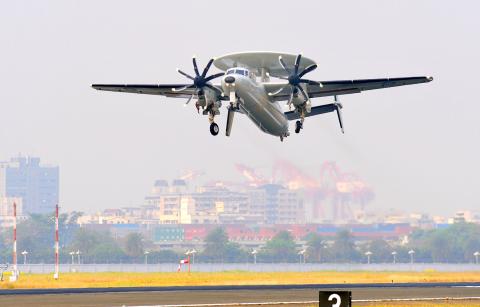The Ministry of National Defense yesterday confirmed a media report that said an air force major has been detained on suspicion of leaking confidential information gathered from E-2 Hawkeye early warning aircraft to Chinese nationals.
The Chinese-language United Daily News reported yesterday that an air force major surnamed Hau (郝), who served in the electronic warfare unit at Pingtung Air Force Base, allegedly delivered confidential information gathered from the E-2s to Chinese nationals through a Taiwanese civilian. Hau has been charged with breaching the National Security Act (國家安全法), the report added.
The ministry said in a press release yesterday that the Taiwan High Prosecutors’ Office’s Greater Kaohsiung branch on Sept. 25 applied to detain Hau, which was granted.

Photo: Chang Chung-yi, Taipei Times
The military’s security unit became concerned about Hau and referred the case to prosecutors for further investigation in June, the press release said, adding that Hau was the only suspect, and that media reports saying more than 10 military personnel were involved were inaccurate.
According to the United Daily News report, prosecutors raided Hau’s office and residence. They also found “unclear sources of funds” in his bank accounts.
The ministry, citing a gag order because the case is under investigation, said it would not comment further.
The air force procured four E-2T aircraft from the US in 1995. After adding two more E-2K planes in 2006, it currently has six Hawkeyes in service. In 2010 two E-2Ts were upgraded to E-2Ks.

A Ministry of Foreign Affairs official yesterday said that a delegation that visited China for an APEC meeting did not receive any kind of treatment that downgraded Taiwan’s sovereignty. Department of International Organizations Director-General Jonathan Sun (孫儉元) said that he and a group of ministry officials visited Shenzhen, China, to attend the APEC Informal Senior Officials’ Meeting last month. The trip went “smoothly and safely” for all Taiwanese delegates, as the Chinese side arranged the trip in accordance with long-standing practices, Sun said at the ministry’s weekly briefing. The Taiwanese group did not encounter any political suppression, he said. Sun made the remarks when

The Taiwanese passport ranked 33rd in a global listing of passports by convenience this month, rising three places from last month’s ranking, but matching its position in January last year. The Henley Passport Index, an international ranking of passports by the number of designations its holder can travel to without a visa, showed that the Taiwan passport enables holders to travel to 139 countries and territories without a visa. Singapore’s passport was ranked the most powerful with visa-free access to 192 destinations out of 227, according to the index published on Tuesday by UK-based migration investment consultancy firm Henley and Partners. Japan’s and

BROAD AGREEMENT: The two are nearing a trade deal to reduce Taiwan’s tariff to 15% and a commitment for TSMC to build five more fabs, a ‘New York Times’ report said Taiwan and the US have reached a broad consensus on a trade deal, the Executive Yuan’s Office of Trade Negotiations said yesterday, after a report said that Washington is set to reduce Taiwan’s tariff rate to 15 percent. The New York Times on Monday reported that the two nations are nearing a trade deal to reduce Taiwan’s tariff rate to 15 percent and commit Taiwan Semiconductor Manufacturing Co (TSMC, 台積電) to building at least five more facilities in the US. “The agreement, which has been under negotiation for months, is being legally scrubbed and could be announced this month,” the paper said,

Japan and the Philippines yesterday signed a defense pact that would allow the tax-free provision of ammunition, fuel, food and other necessities when their forces stage joint training to boost deterrence against China’s growing aggression in the region and to bolster their preparation for natural disasters. Japan has faced increasing political, trade and security tensions with China, which was angered by Japanese Prime Minister Sanae Takaichi’s remark that a Chinese attack on Taiwan would be a survival-threatening situation for Japan, triggering a military response. Japan and the Philippines have also had separate territorial conflicts with Beijing in the East and South China